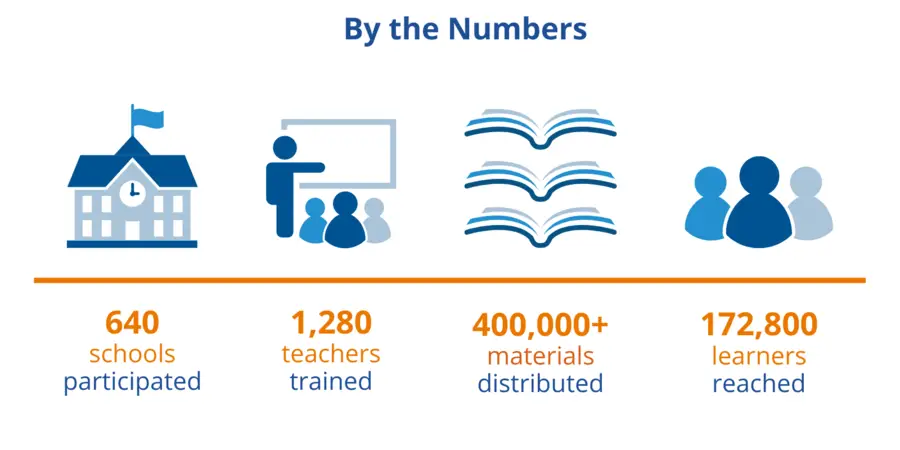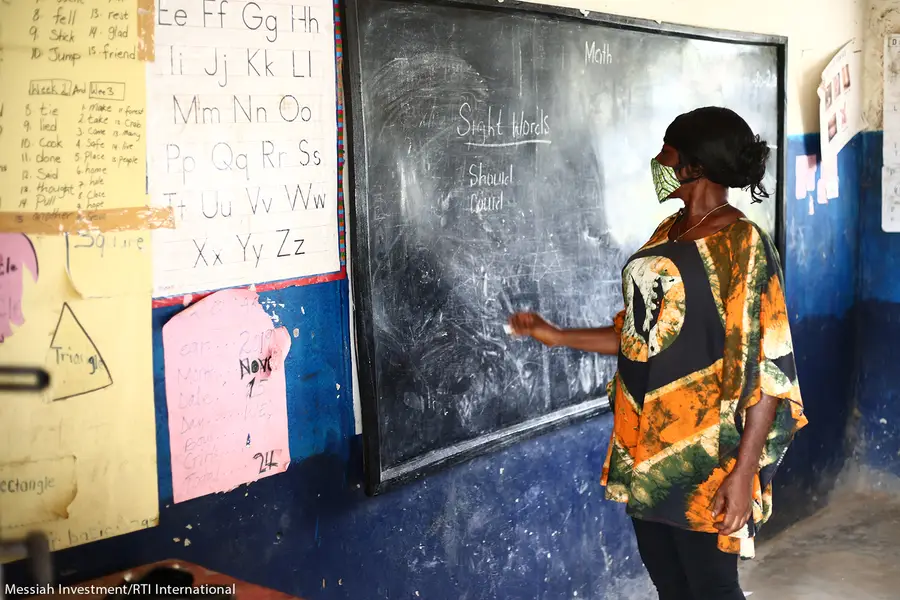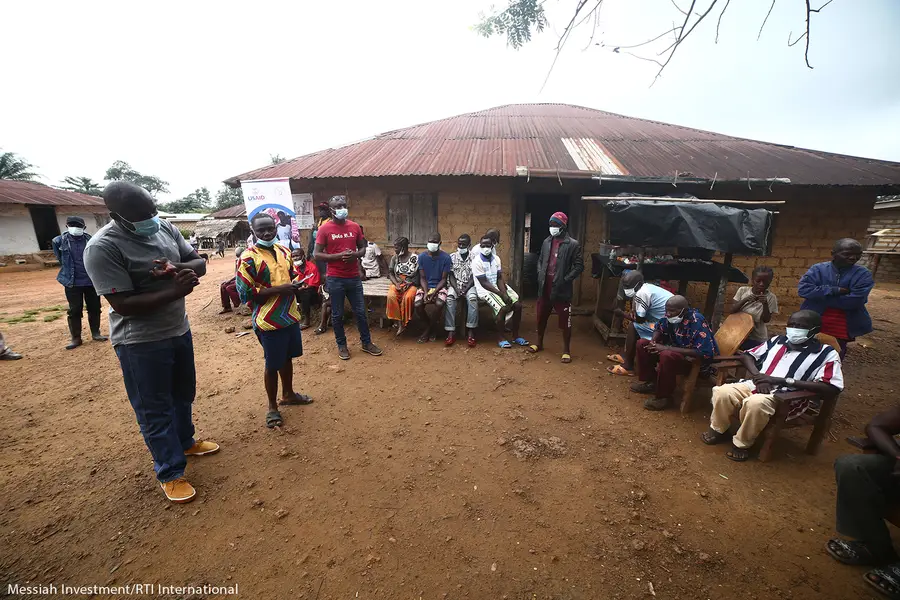USAID Read Liberia Activity: A Model for Early Grade Reading
Objective
To improve early grade reading skills for Liberian students in grades one and two and to pilot-test a program designed to support emergent literacy skill development for Liberian children in public kindergarten schools.
Approach
Work in partnership with the Liberian Ministry of Education (MOE) to improve reading instruction and availability of quality reading materials, and to increase parent, community, and private-sector involvement to create a reading culture within households and in the community.
Impact
Significantly strengthened students’ oral reading fluency and oral reading comprehension skills, with grade 1 and 2 students performing twice as well as students in a control group. Kindergarten students also showed significant gains in three core pre-reading skills—expressive vocabulary, letter names, and listening comprehension—relative to comparison children. The Activity has also assisted the MOE in shifting to a remote learning mode in immediate response to COVID-19-related school closures.

With funding from USAID, and through direct partnership with the Liberian Ministry of Education (MOE), Read Liberia (2017-2022) sought to improve the early grade reading (EGR) skills of Liberian students in grade 1 and grade 2 reaching 172,800 students across nearly 640 primary schools in six targeted counties—Bong, Grand Bassa, Lofa, Margibi, Montserrado, and Nimba. Read Liberia also pilot tested support for emergent literacy skills among 5,203 Liberian students in 60 public kindergarten classes over two years.
An external impact evaluation conducted by NORC at the University of Chicago showed that going through the Read Liberia program significantly improved oral reading fluency and reading comprehension among students, both of which are core indicators of reading ability. Read Liberia increased the number of fluent readers and improved the performance of beginners and intermediate readers. These reading skills improvements are similar between girls and boys.
Increased Government Commitment to and Support of Evidence-Based Reading Instruction
To leverage government support of evidence-based reading instruction, Read Liberia helped the MOE to develop and institutionalize key policy documents for teacher training, a policy framework for EGR, and performance standards for teachers and students. The Activity trained over 700 principals, District Education Officers, and County Education Officers to provide direct support to teachers in the classroom. It also supported the Ministry in conducting, analyzing, and utilizing student progress data to inform policy.
Over its first four years, Read Liberia worked collaboratively with MOE Departments of Instruction, Planning, and Administration to develop and implement a plan for systematically transitioning core components of the USAID Read Liberia model and implementation to the MOE. This involved direct engagement with school principals and vice principals as well as local District Education Officers who are at the forefront of implementation and who will take over the responsibility for the core EGR coaching and supervisory elements of Read Liberia.
Improved Access to and Use of Quality Evidence-based Reading Materials
Read Liberia partnered with the MOE’s Bureau of Early Childhood Development to develop and pilot a play-based kindergarten program to benefit learners in Early Childhood Education centers. The kindergarten teacher guides were developed to directly align with existing curriculum themes, so that teachers could easily integrate the 30-minute literacy lessons into their daily routine.
Getting improved reading materials into the hands of students was a challenge identified early on during implementation—manual tracking, billing, and weather often impeded the safe and timely distributions of materials. In response, the project developed and deployed a new tracking system which uses both the open-source KoBo application and proprietary Microsoft Power BI to combine data collection and analytics tools on tablets, resulting in a system that enabled robust accountability and real-time monitoring and reporting. Tracking data fed into dashboards which were then used to virtually track the progress and challenges of distribution teams in the field, allowing for daily operational and adaptive management-based decision-making.

Teacher Support is Essential to Student Reading Outcomes
Core to the ability of Read Liberia to impact student reading was developing the capacity of teachers to effectively use the evidence-based reading instruction materials developed under the Activity. To do so, Read Liberia utilized a comprehensive approach to teacher professional development that included twice annual teacher trainings, small and more localized cluster-based teacher trainings, and in-school mentoring provided by reading coaches.
Read Liberia supported the professional development of 1,280 grade 1 and grade 2 teachers and 60 kindergarten teachers and built capacity within the MOE to manage the EGR coaching and supervisory roles before the Activity ended, and thereafter.
Increased Parent, Community, and Private Sector Support for Early Grade Reading
Read Liberia actively engaged communities in support of student learning. With partner DEEP, the Activity established nearly 50 new parent-teacher organizations and regularly held mobilization meetings to encourage and provide parents and communities with the tools to support EGR. As a result, community leaders and parents established over 2,600 reading spaces for after-school reading in 2,580 school communities across the six target counties. These spaces include town and community halls, palava huts (where people traditionally meet to settle disputes and discuss community matters), churches, homes, and other places.
Research done through phone interviews indicated that due to school closures caused by COVID-19, home support to children intensified. Parents increased the reading time proposed by Read Liberia from the planned 10 minutes to 15 to 20 minutes daily. Parents also reported that the support via phone calls and text messages helped them to allocate more time to helping their children read at home.
To encourage sustainability of activities, Read Liberia engaged the private sector to support EGR activities. Local small business partners supported reading activities, including airing Read Liberia jingles and promoting the Read Liberia messages at their business locations.

Adapting to COVID-19: Virtual Classroom Instruction and Teacher Support
As a result of COVID-19 travel and meeting restrictions, in the spring of 2020, Read Liberia supported the MOE's Education in Emergency (EiE) Teach by Radio Program pivot from in-class to radio-based programming for students. This included developing, recording, and providing radio programs for grades 1 and 2 that aired on 12 national and community radio stations. In addition, the Activity pivoted to providing remote support for teachers and parents, using phone calls and text messages to encourage families to listen to the radio programs and make time and space in the home for children to read.
Research on the Activity’s reach and impact during the COVID-19 period of virtual instruction found that many families did not have radios, but students who had access to them were motivated to listen to the lessons and benefited from them. While only 40% of parents who were interviewed reported listening to the Teach by Radio Program, nearly three-quarters (71%) of those reported listening specifically to the lessons that Read Liberia developed. Nearly all parents also indicated that someone in the household listened to the lessons with the child, as recommended, and 86% felt their child learned from the radio lessons.
The Read Liberia’s community mobilizers also implemented a “no-contact” mode of engagement with nearly 2,000 parents and other community members in 758 school communities, replacing face-to-face meetings with phone calls and WhatsApp or SMS communication. Through these continued interactions, parents reported giving their children more time to read at home, and over 1,300 parents said they established home reading spaces for their children.
The challenges facing Liberia are real, but so is the drive to make quality instruction available for all Liberian children. The MOE has demonstrated its leadership and political will to improve the quality of its education system, and with the support of USAID through the Read Liberia Activity, the policies, capacity, and infrastructure needed to achieve this goal are increasingly in place.
- U.S. Agency for International Development
- Another Option
- Brattle Publishing Group
- Diversified Educators Empowerment Program (DEEP)


